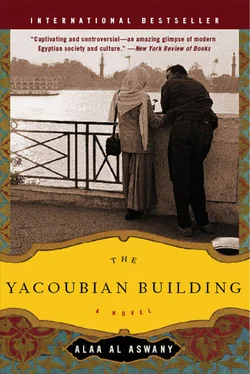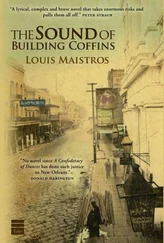Alaa Al Aswany - The Yacoubian Building
Здесь есть возможность читать онлайн «Alaa Al Aswany - The Yacoubian Building» весь текст электронной книги совершенно бесплатно (целиком полную версию без сокращений). В некоторых случаях можно слушать аудио, скачать через торрент в формате fb2 и присутствует краткое содержание. Год выпуска: 2006, ISBN: 2006, Издательство: Adobe Acrobat eBook Reader, Жанр: Современная проза, на английском языке. Описание произведения, (предисловие) а так же отзывы посетителей доступны на портале библиотеки ЛибКат.
- Название:The Yacoubian Building
- Автор:
- Издательство:Adobe Acrobat eBook Reader
- Жанр:
- Год:2006
- ISBN:978-0-06-087813-9
- Рейтинг книги:5 / 5. Голосов: 1
-
Избранное:Добавить в избранное
- Отзывы:
-
Ваша оценка:
- 100
- 1
- 2
- 3
- 4
- 5
The Yacoubian Building: краткое содержание, описание и аннотация
Предлагаем к чтению аннотацию, описание, краткое содержание или предисловие (зависит от того, что написал сам автор книги «The Yacoubian Building»). Если вы не нашли необходимую информацию о книге — напишите в комментариях, мы постараемся отыскать её.
The Yacoubian Building — читать онлайн бесплатно полную книгу (весь текст) целиком
Ниже представлен текст книги, разбитый по страницам. Система сохранения места последней прочитанной страницы, позволяет с удобством читать онлайн бесплатно книгу «The Yacoubian Building», без необходимости каждый раз заново искать на чём Вы остановились. Поставьте закладку, и сможете в любой момент перейти на страницу, на которой закончили чтение.
Интервал:
Закладка:
He replied with a friendly smile, “God willing.”
“What’s your name?”
“Khalid Abd el Rahim, from Asyut. What’s yours?”
“Taha el Shazli, from here in Cairo.”
This was the first acquaintance Taha made and in fact from the first moment, just as oil separates from water and forms a distinct layer on top, so the rich students separated themselves from the poor and made up numerous closed coteries formed of graduates from foreign language schools and those with their own cars, foreign clothes, and imported cigarettes. It was to these that the most beautiful and best-dressed girls gravitated. The poor students, on the other hand, clung to one another like terrified mice, whispering to one another in an embarrassed way.
In less than a month, Taha had become friends with the whole mosque group. Khalid Abd el Rahim, however, with his short stature, his body that was as dry and thin as a piece of sugarcane, his deep brown complexion, and his glasses with the black frames that lent his face a serious, self-possessed cast, so that, in his modest, classic clothes he looked much like a recently graduated teacher in a state school, remained the one for whom he felt the greatest affection. Taha’s affection for him may have been due to the fact that he was as poor as or even poorer than he was (as witnessed by the darns in his socks, which always showed during prayer). He was also fond of him because he was deeply religious and when praying would stand and invoke God’s presence in the full meaning of the words, placing his folded hands over his heart and bowing his head in total submission so that anyone who saw him at that moment might have imagined that if a fire broke out or shots were fired next to him, these would not distract him from his prayer for an instant. How Taha wished he could attain the same faith and love for Islam as Khalid! Their friendship grew stronger and they spoke to each other frankly and confided in each other, sharing the same distaste at the daily displays of frivolity they saw on the part of some of their affluent male colleagues and at their abandonment of the True Religion, as well as at the shamelessness of some of their female colleagues, who would come to the university dressed as though for a dance party.
Khalid introduced his friend Taha to others from the university dormitories — all country boys, good-hearted, pious, and poor — and Taha started to visit them every Thursday evening to pray the final evening prayer and stay up with them chatting and discussing. Indeed, he benefited greatly from these discussions, for he learned for the first time that Egyptian society was at the same stage that had prevailed before Islam and it was not an Islamic society because the ruler stood in the way of the application of God’s Law, while God’s prohibitions were openly flouted and the law of the state permitted alcohol, fornication, and usury. He learned too the meaning of communism, which was against religion, and of the crimes committed by the Abd el Nasser regime against the Muslim Brothers, and he read with them books by Abu el Aala el Mawdudi, Sayed Kutb, Yusef el Karadawi, and Abu Hamid el Ghazali. After several weeks, the day came when following an enjoyable evening with his friends from the dorms, they stood up to bid him farewell as usual and at the door Khalid Abd el Rahim said to him suddenly, “Where do you do your Friday prayer, Taha?”
“At a small mosque near the house.”
Khalid and his brethren exchanged a look and Khalid then said gaily, “Listen, Taha. I’ve decided to use you to get myself some reward in Heaven. Wait for me tomorrow at ten in Tahrir Square in front of the Ali Baba cafe. We’ll pray together at the Anas ibn Malik Mosque and I’ll introduce you to Sheikh Shakir, God willing.”

Two hours before the Friday call to prayer, the mosque of Anas ibn Malik filled to capacity with worshippers. They were all Islamist students, some wearing Western clothes but most in Pakistani dress — a white or blue gallabiya that reached to just below the knees with trousers of the same color beneath it and on their heads a white turban whose tail dangled at the back of the neck. These were all devotees and followers of Sheikh Muhammad Shakir and they came to the mosque early on Fridays to reserve their places before the crowd came and pass the time making acquaintances, reciting the Qur’an, and engaging in religious discussions. Their numbers grew until the place became too small to hold them all and the mosque officials brought out dozens of mats and spread them in the square opposite the mosque. This too filled to capacity with worshippers so that the traffic was brought to a standstill; even the enclosed balcony of the mosque, which was reserved for female students, despite being hidden from sight was the source of a loud murmuring that indicated that it was filled to overflowing as well.
Someone turned on the mosque’s loudspeaker and it emitted a loud squeal; then the sound cleared and one of the students started to chant the Qur’an in a sweet, submissive voice, the students listening to him with rapt attention. The atmosphere was fabulous, authentic, and pure, the ascetic, homespun, primitive scene bringing to mind the first days of Islam. Suddenly, shouts of “There is no god but God” and “God is most great” rang out and the students, rising, crowded one another to shake the hand of Sheikh Shakir, who had finally arrived. He was about fifty and stocky, with a sparse beard dyed with henna, a face not without certain good looks, and wide, impressive, honey-colored eyes. He was dressed in the Islamist fashion like the students, with a black shawl over his robes. He knew most of the students crowding around him, and shook their hands and embraced them, asking them how they were. It took a long time for him to mount the pulpit and take from his pocket a siwak, with which he purified and sweetened his teeth. Then he said, “In the name of God, the Merciful, the Compassionate,” and the cries of “God is most great” redoubled in strength until the walls of the mosque shook. The sheikh made a gesture with his hand and immediately complete silence reigned.
Starting his sermon with praise and thanks to God, he continued, “Beloved sons and daughters, I want every one of you to ask himself this question: ‘How many years does a man live on this earth?’ The answer is that the average lifespan, at the best estimate, does not exceed seventy years. This, when we come to think about it, is a very short time indeed. Moreover, a man may be afflicted at any moment with a disease or by an accident and die. If you ask among your acquaintances and friends, you will find more than one who has died suddenly while young, and it would never have occurred to any of those who died young that they would die. Pursuing this line of thinking, we find that Man has two choices before him, no more. He may focus all his efforts on his life in this fleeting, brief world that may come to an unexpected end at any moment, in which case he is like the man who wants to build himself a luxurious, elegant house but makes it of sand, on the seashore, so that the house is exposed to the possibility that at any moment a wave may come and knock it down; this is the choice that is doomed to failure. As for the second choice, that to which our Lord, Almighty and Glorious, calls us, it requires that the Muslim live in this world from the perspective that it is a brief and passing stage in the life of the immortal soul. One who lives their life in this way will gain both this world and the next and be always happy, content in mind and conscience, and courageous, fearing none but our Lord, Almighty and Glorious. The true believer has no fear of death because he does not consider it the end of existence, as the materialists believe it to be. Death for the believer is the transition of the soul from the ephemeral body to everlasting life. It was this sincere faith that allowed a few thousand of the first Muslims to be victorious over the armies of the great empires of that time, such as Persia and Byzantium. Those simple Muslims were successful in raising the banner of Islam in every part of the world through the strength of their faith, their true love for death in God’s cause, and their deep contempt for the evanescent pleasures of this world. God has made it incumbent upon us to struggle to raise high His word. Gihad is a pillar of Islam, exactly like prayer and fasting. Indeed, gihad is the most important of those pillars but the corrupt rulers dedicated to the pursuit of money and the pleasures of the flesh who have ruled the Islamic world in times of decadence have attempted, with the help of their hypocritical men of religion, to exclude gihad from the pillars of Islam, knowing that if the people cleaved fast to gihad, it would in the end be turned against them and cost them their thrones. In this way, by eliminating gihad, Islam was robbed of its real meaning and our great religion was transformed into a collection of meaningless rituals that the Muslims performed like athletic exercises, mere physical movements without spiritual significance. When the Muslims abandoned gihad, they became slaves to this world, clinging to it, shy of death, cowards. Thus their enemies prevailed over them and God condemned them to defeat, backwardness, and poverty, because they had broken their trust with Him, the Almighty and Glorious.
Читать дальшеИнтервал:
Закладка:
Похожие книги на «The Yacoubian Building»
Представляем Вашему вниманию похожие книги на «The Yacoubian Building» списком для выбора. Мы отобрали схожую по названию и смыслу литературу в надежде предоставить читателям больше вариантов отыскать новые, интересные, ещё непрочитанные произведения.
Обсуждение, отзывы о книге «The Yacoubian Building» и просто собственные мнения читателей. Оставьте ваши комментарии, напишите, что Вы думаете о произведении, его смысле или главных героях. Укажите что конкретно понравилось, а что нет, и почему Вы так считаете.












